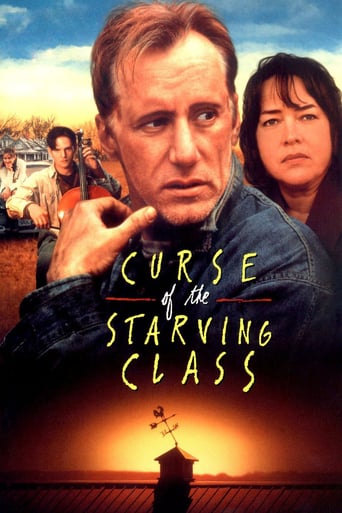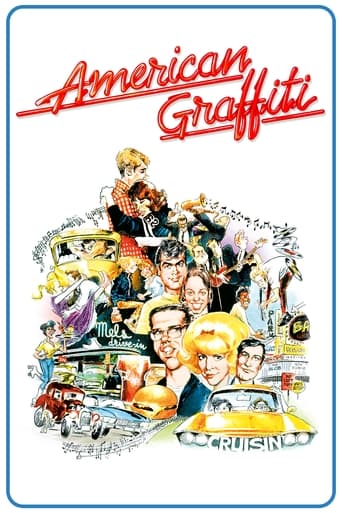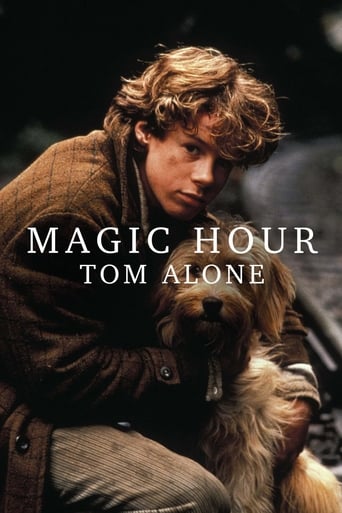Curse of the Starving Class (1994)
Curse of the Starving Class is a play by Sam Shepard, considered the first of a series on family tragedies. Drama about a dirt-poor 1950's-era farm family. Dad's a foul talking drunk and Mom is desperately trying to save what's left of their family life.
Watch Trailer
Cast


Similar titles
Reviews
You won't be disappointed!
People are voting emotionally.
One of my all time favorites.
The movie turns out to be a little better than the average. Starting from a romantic formula often seen in the cinema, it ends in the most predictable (and somewhat bland) way.
"Curse of the Starving Class" is one of those family drama films destined to provoke different reactions from its audiences, leaving you uneasy or very depressed. Judging by what was written by previous reviewers, the film is difficult, slow and of reduced appeal, and goes to show it current low rating. Somewhat undeserving. A clinical mind and view is needed in order for you to embrace the ideas presented here, because this good adaptation of Sam Shepard's play has more than it meets the eye. It holds relevance despite the strange outcomes the story brings us and there's plenty of good qualities despite of the film and its many problems. It misses the chance of being great due to circumstances unknown to us, which revolves around director and casting choices. I'll return to those points far ahead.On a desolate farm in the middle of nowhere lives the Tate family. The mother, Ella (Kathy Bates) tries to maintain her family and keep things working as usual while her husband Weston (James Woods) spends all of his time out of the farm, heavily drinking and causing disturbance when he's back home. And then there's the son and daughter: the young and idealist Wesley (Henry Thomas) who's very helpful in the best way he can but he's also an easily irritable person, who likes to annoy his younger sister, Emma (Kristin Fiorella), a rebellious teen of her own who feels inadequate in this place with these people and wants to leave immediately, given the opportunity or the courage to leave everything behind.The turn of events here comes when we discover that Ella is trying to sell the farm to the lawyer Taylor (Randy Quaid), without Weston finding. Ella dreams of taking the kids and move to Europe, far away from her low-life husband. The mountain of difficulties gets bigger when it's revealed a possible affair between Ella and the lawyer who was involved in a swindled business with Weston. While the alleged man of the house isn't there, always on the run from a pair of menacing thugs of whom he owes some money, the young members of the Tate family watch several events unfolding between their mom and Taylor.By opening wounds of this gathering of characters and hardly ever shying away from pain and misery, this is a work that reveals a real and maddening view of people. The starving class of the title is a lot more than what the Tate family members keep on repeating from time to time when there's no food in the house. It's a different kind of starvation, one that revolves around broken hopes and dreams, shattered lives, and yet despite the hopelessness of it all they still cling for a life change, they're starving on those good things. Ignoring the past, barely living the present and just wishing for a better future but without finding the proper ways of moving forward. A kind of hunger that doesn't disappear even with some positive changes; it's just life happening, people always wanting more just to appease our endless sense of chronic dissatisfaction. A text this meaningful as Shepard's play probably is (haven't seen it, but read the outline and major plot points) can only work with precision and quality if the cast attached to it knows how to operate. Indeed, the film's triumph resides with the stellar cast and they're the ones who make the film gain a strange form of appeal, even though some of the performances are erratic. Kathy Bates plays against the usual decisive hard woman type, she's more vulnerable, frail and makes of Ella the most sympathetic character of the group; Henry Thomas delivers another good performance as usual; Quaid is always fine when he plays crooks with a sense of humor (and speaking of humor, the film has plenty of it specially Wesley and Emma bickering). However, there's problems with an over-the-top James Woods, his fast-talking trademark isn't suitable to such a loud and drunk character - but towards the conclusion he brings some quality (Shepard or Jeff Bridges in this role would be greater); and the newcomer and vanished from the screen after this film, Kristin Fiorella. Works nice with some comedic elements but just like Woods she does too much.As you see, the cast is interesting but we wonder, who's behind this? A director that no one knows, didn't have any directorial credits before this film and only made two more projects - and perhaps that's why the film never accomplishes a destined greatness. J. Michael McClary's direction of actors is fine, but by not allowing the film work in a play sense, throwing an intrusive music at almost every scene, he turned a powerful drama into a strange melodrama. The music is fine but it's excessive use was very poor. And Emma's attack on the bar was ridiculously filmed, it's truly unbelievable (the moment is in the actual play). And I wonder why Bruce Beresford (screenwriter/producer of this piece) wasn't the one directing? His instincts and film knowledge would improve a film like this (as for his adaptation, he should remove some of poetic bits of Wesley). In the end, we have a fine movie faulted by the director with some unwise choices.For those who know or read the play, be ready to get slightly disappointed due to the countless changes made for this film version (the conclusion is more upbeat than in the play, but the one presented on it had a lot more impact than the one seen in the film). But the atmosphere, the realization that you're seeing real characters and not something else, is what makes of "Curse of the Starving Class" a film to not be missed. 8/10
The Curse of the Starving Class is one of the most important things in my life. It was the play that made me want to be a playwright. It was play that made me fall in love with theatre for something more than just something to do to pass my time in high school. I encourage everyone of you to go out and read it, along with all other Sam Shepard plays you can get your hands on.Since I learned a movie version was made of it a long time ago, I had been looking for it all over the place, and tonight I was lucky enough to catch it from the very beginning on IFC. I must say, I loved this movie. They changed some things, omitted some (which made me a little angry) but over all, it was excellent. It was exactly how it should be, in all of it's ass dragging glory.Let's get out my complaints first. Don't worry, I'm not going to go on a rant about how the play is far superior to the movie. This wasn't the play, it's the movie. It was different. It's hard to keep that in mind, but you have to while watching it.(*SPOILERS*. Skip the next two paragraphs if you do not wish to know key events and the ending.)The first thing I have to complain about is they told you about Weston's bad purchase of land far too early in the movie. It was something that was more effective learning about later. The second is the total omission of the eagle and cat story. This was the most beautiful moment in the play, if not one of the most beautiful moments in theatre. But, since this was a movie, I understand the need to leave out things that aren't really important to the plot so that it moves nicely (Though that almost defeats the purpose of Sam Shepard.). The third is that they explained the significance of Wesley wearing his father's clothes way too much. I felt that it was more effective for the audience to infer what it meant, rather than them to come out and say it. The fourth, and last problem, was the end. They totally changed the ending. In the movie, Emerson and Slater didn't come back for their money in the end, and Ella didn't blow up in the car, she just rode away on her horse. The way they ended the movie is far different from the play, but like I said, they are different, so you have to keep that in mind. It was effective, how they ended it. Emerson and Slater letting it go, and Ella not dying. Not as good, but still effective.Now for the things that I absolutely loved about the movie. THE P***ING! I loved this moment in the play, and they kept it in the movie. Wesley p***es all over his sister's school project. This was a beautiful moment that meant a lot. The scene when Des comes into the house and turns the lightbulb in the kitchen on. That was a wonderful choice. I guess you would have to have read the play a few times, and seen the movie to understand what this meant. The whole thing centered around how they were starving and there was no food in the house. When Des screwed the lightbulb in, this (to me) symbolized that now they could afford food. How you ask? Well, where is food, and light in the same place? The fridge. Now that they have money to buy food, they now have a reason to open the fridge. I loved this. When Wesley strips down, he runs through the field naked. This left me thinking (I dunno why) that this was almost necessary to the film. There were a lot more moments that I loved, but I really can't put my finger on them right now. I'm going to have to watch it a few more times.The whole film was great. I loved it. All of you should watch it. As Weston explained in the movie, everyone needs a good hard table to sleep on once in a while to remind you where you've come from. This movie was my hard table to sleep on. It brought me back to years ago when I decided to devote my life to attempting to write something that even resembled art.Some people hated it because it supposedly drug on and on. I'm going to have to agree, but that is how it was meant. If you do not have the patience to view this fine piece of cinema. You will thoroughly enjoy it. Oh, and consider yourself hereby warned about James Woods' full frontal nudity shot if you are easily offended.
This message mainly goes out to satisil2. Have you read the play? Nothing happens. That's it. It just goes and goes and goes. . . Not to say I didn't enjoy it, I'm quite a Sam Shepered fan, myself (for a real thrill, watch True West)but that's how his plays are. It's more about the characters than the plot. Sorry to hear you didn't enjoy it. Pretty good depiction of the dirt poor (or starving class, as one may call it)
This would've been a *great* silent film. The acting really is good, at least in a Look Ma, I'm Doing Really Big Acting! sort of way.Everything is HUGE. Every line is PROFOUND! Every scene is SHATTERED BY HUMAN TRAGEDY!Mostly, I felt like gagging. Yet, like any train wreck, I couldn't tear my eyes away. This dialogue might've worked on the stage, although I doubt it. On the screen, it was cluttered, haphazard, hackneyed and pretty much every other stereotypical negative adjective you can come up with to describe a really bad dramatic work.If you enjoy your melodrama in huge, heaping doses, you *might* enjoy the movie. Be prepared to wait, however. For all that melodrama, this thing sure plods along at its own pace.This script must've sounded a lot different when the actors involved were reading it to themselves. It simply doesn't work once they get around to delivering it in front of the camera.IMDB does us a great disservice, at times, when it uses its goofy computer-controlled "weighted score". Curse of the Starving Class deserves less than a 1.Character-driven fiction is great, but when you develop your characters by simply pushing them through hoops with no plausible explanation for their maturation or evolution, it isn't character development! Your characters must have a motivation. Being drunk for a while and waking up in a field is *not* character development. That's a plot contrivance.Stay away from this movie. Or at the very least, watch it muted. Perhaps you'll get some amusement from all the arm-waving the characters do.Oh, and word to the wise -- to prove that this is truly an artsy film, you see James Woods in all his dangly male "look-at-me, I'm-the-figurative-and-literal-representation-of-the-naked-vulnerability-of- man" glory.Don't say you weren't warned.
















